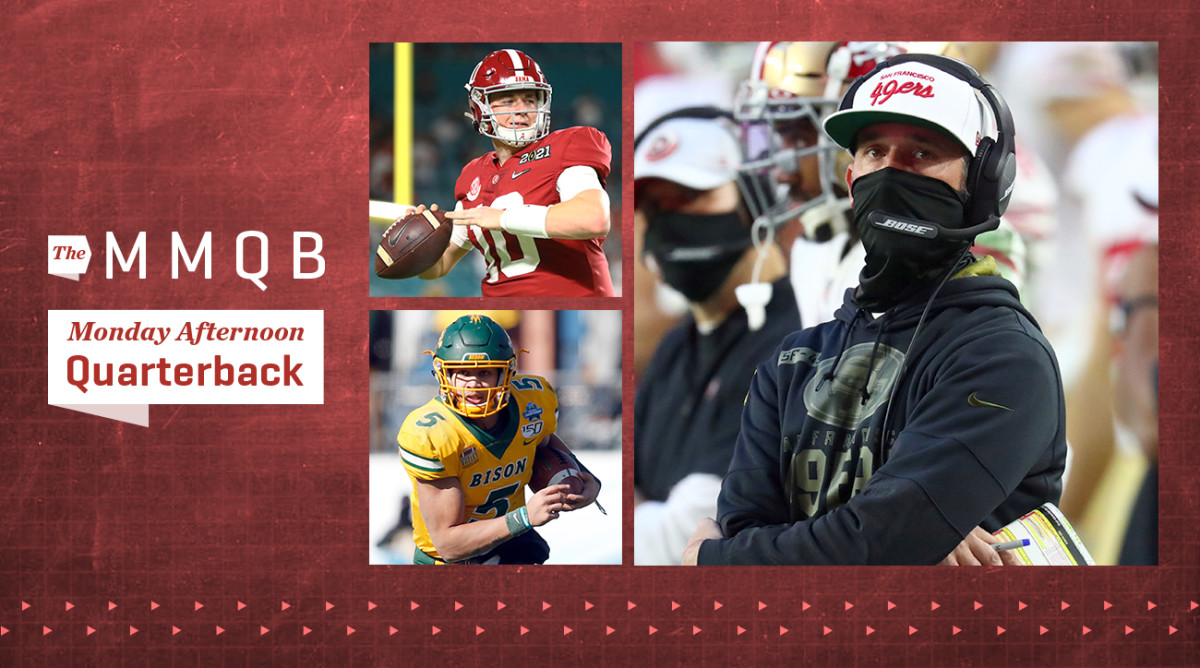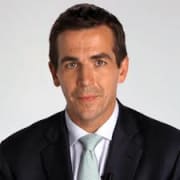MAQB: Kyle Shanahan's Secrecy Over the No. 3 Pick Is Fun
Three days left, so we’re going all draft in this week’s MAQB …

• I figured we’d get started with a global look at the class, and how it’s made up, per the teams that will be drafting out of this particular pool of players. Here’s what those teams are looking at, per one GM: “From 20 down, you can pick them out of a hat. Who knows? Someone you might have at 60 could be going there.” That dynamic speaks to two things. First, the weird draft cycle (no private workouts, no 30 visits, no combine, just one all-star game and limited school calls in the fall) has made for more guesswork, and less consistency in how players should fall from team to team. And two, there aren’t a ton of elite prospects this year. Some teams will be into their second-round grades by the late teens. I haven’t found a single team yet with more than 18 players carrying first-round grades on their board.
• That could make the trade market interesting. Teams in the teens might be reluctant to go back very far, if they see a cliff around No. 20. And it could lead to more activity around the bottom of the top 10, too. As we said in the MMQB column, the Patriots have explored going up (presumably for a QB) and the Eagles have too (my belief is it would be for a corner), but others in that range have looked at the idea of making a short move into the top 10 for an offensive lineman. So right there, you can see the scarcity of top-shelf corners (Patrick Surtain II, Jaycee Horn), and the drop off from the top two linemen (Penei Sewell, Rashawn Slater) to the second tier creating a little tension.
• Kyle Shanahan’s secrecy over the third pick on Monday was fun—the Niners coach told the Bay Area media that there are five quarterbacks (Trevor Lawrence is in play!) he’d be comfortable taking at No. 3. In the end, does it serve a purpose? Other than the old, What if this guy gets hit by a bus between now and then? line of thinking, probably not. (I think Shanahan likes messing with people with this stuff.) And it doesn’t really serve a purpose for the Jags or Jets to hide their intentions either, when there’s really nothing in the way of those teams getting their guy. So why the unnecessary smokescreens? It’s actually driven by Park Ave. The league office has routinely warned teams at the top over the years about killing the drama of draft night by letting the cat out of the bag. I think that’s a little dumb, given that we’ve known Lawrence was going to be the first pick in the 2021 draft for more than two years now. But doing things like protecting their TV shows is one reason why they print money in that corner of midtown Manhattan, so good for them, I guess.
• I’m planning, at some point this week, to give you detailed scouting reports on all five of the expected first-round quarterbacks. But since the Mac Jones subject came up again today on social media, I figured it was worth thumbing through some of my notes on him—and what some NFL people are seeing that the general public isn’t. We covered some of that in last week’s GamePlan, with Texas coach Steve Sarkisian bringing insight into the Alabama offense he called and Jones ran. There’s more, too. I mentioned on social media on Monday morning that one GM told me that, while Bama was loaded around Jones, it was rare that one of his receivers really had to work for the ball. For the most part, he was on time and on target, all of the time. One head coach added to the point in saying, on Tide weaponry, “Those guys make plays but never in spite of Mac.” And here’s another GM on Jones: “We’ve discounted the pocket passer, and we’re discounting him, because there are so many unique athletes that play the position now. But this guy’s good. He’s deadly accurate. He doesn’t have a powerful arm, but it’s plenty good enough. He needs players around him, he needs really good players, and he was driving a Cadillac at Bama. But he can play.” So when I add all this up, really, what I come away with is that Jones will probably make a team happy in Years 2 and 3, but I’d be a little worried that in Year 5 or 6, he might leave them wanting more from the position.
• One thing that’s come up over and over again with Trey Lance, also in the running to go third, is his lack of pass attempts as a collegian. There was only one occasion in 2019 in which Lance threw the ball more than 23 times. He threw fewer than 20 attempts in nine of his 16 games. And in the national title game, one of only two games the Bison failed to win by double-digits, Lance threw it a total of 10 times (and ran it 30) as NDSU capped a 16–0 season. You could argue the gap between NDSU and its opponents is bigger than the gap between Bama and its opponents, which added up to less evidence of Lance being in critical situations. Doesn’t mean he can’t do it. The guy won a national title, after all. There just isn’t as much evidence one way or the other that he can. Now, there’s a lot of positive here, too. He’s got a howitzer for an arm, is super athletic and has a reputation for being a great kid. On top of that, he’s flashed football smarts in his meetings. So the makeup is there, and that’s key when you fall back on the Josh Allen comp, which I think is valid. Allen had some of the same issues Lance does coming into the pros (accuracy, mechanics). The Bills bet on the come, created the right environment for him and are now collecting massive dividends. If someone can give Lance a similarly good environment to come up in? Look out.
• Not all character flags are created equal, and so it’s worth sorting through some first-rounders who’ve had to answer for their reputations. Oregon’s Penei Sewell will likely be the first in this crew to be drafted, and there’s no question Sewell has some growing up to do. But I’ve talked to some people who’ve been digging on him who say that, in his NFL city, that’ll probably happen—and that his immaturity really hasn’t shown up in the football part of his life (although he could be more consistent on the field). Penn State’s Micah Parsons, similarly, has to mature, and I’ve sensed similar confidence that’ll happen. Parsons, as one person put it, carries himself like “someone who’s had his ass kissed his whole life.” Which won’t be disqualifying for too many people. Alabama’s Christian Barmore, conversely, is a little bit of a more difficult one for teams to wrap their arms around—and that’s one reason why he’ll go later than his talent should dictate.
• While we’re there, Miami’s Jaelan Phillips is widely seen, based on tape, as the draft’s best pass rusher—it surprised me the sort of consensus I’ve gotten on that the last few weeks. But he’s another one that has non-football issues for teams to sort through. Phillips’s troubles at UCLA were well-documented. The upshot here, after a couple months vetting him, is that most teams seem to believe he’s a really good kid, albeit one with demons. (And he’s been very upfront with teams about those demons too.)
• Another talented player who’s had questions to answer: Kentucky’s Kelvin Joseph. He’s got length and athleticism, and in the words of one veteran executive, “He covered Bama’s guys as well as anyone.” But he also got in trouble at LSU as a freshman before transferring within the SEC, and off-field concerns have lingered. On talent alone, he may be better than any of the expected second-tier corners (Georgia’s Eric Stokes and Tyson Campbell, and Northwestern’s Greg Newsome). It’ll be interesting to see who takes a swing on him—it’ll likely happen at some point early on Friday.
• On the other end of the spectrum, it’s been interesting to hear scouts rave about Ole Miss WR Elijah Moore. He’s the Rebel receiver who had an, uh, interesting celebration in the 2019 Egg Bowl that wound up costing his team a chance to go to overtime with rival Mississippi State. So is there a continuing issue with Moore? Actually, no. Not at all. “A-plus character,” said one assistant coach who met with him. And he’s a really good player. As we’ve said, I wouldn’t be surprised in the least if he’s the fourth receiver to go.
• Each draft can affect the next, and that makes Notre Dame’s Jeremiah Owusu-Koramoah a fascinating case. He was 6' 1" and 220 pounds in Indy earlier this month, had a great pro day, and the Irish used him all over the defense, from a traditional linebacker spot to the slot and as a blitzer. On paper, in today’s NFL, that should be a plus. But everyone sees him a little differently—some might use him like the Patriots use Patrick Chung in their defense, while Ryan Shazier is the comp for others—and what you hear is that “You have to have a plan” for him. Sound familiar? It’s what people said about Isaiah Simmons last year, and I talked to a couple teams over the weekend who felt Simmons’s struggles as a rookie in Arizona could wind up causing some to shy away from taking Owusu-Koramoah early. We’ll see. I think he could go as early as No. 19 to Washington, but because he’s going to be fit-dependent, I also believe the range of where he could be picked is large.
More NFL Draft Coverage:
* Rosenberg: The Unrivaled Arrival of Trevor Lawrence
* Vrentas: MMQB Mock Draft 3.0; 49ers Pick Justin Fields
* Prewitt: What Happens to the Prospects Who Opted Out?
* Orr: Eric Stokes Is a Potential Steal Hiding in Plain Sight
